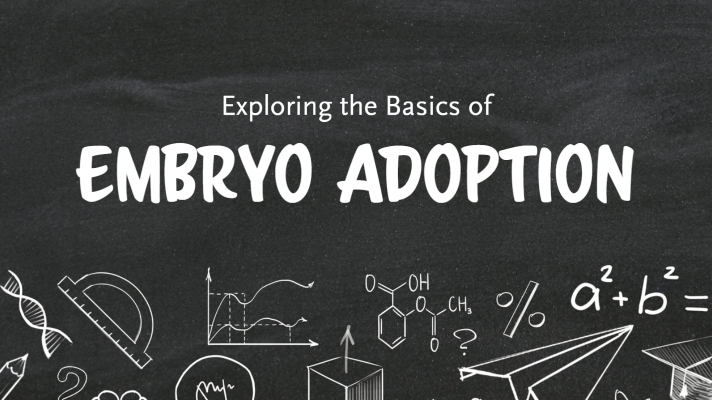Embryo adoption is a unique (and relatively unknown) family building option that provides hope and the possibility of parenthood for families who have been unable to have children. It is also a beautiful way for adoption-hearted families to bring a child or children into their home by providing them with an opportunity for life.
Embryo donation and adoption involves the transfer of embryos donated by couples or individuals who have undergone in vitro fertilization (IVF) and have remaining embryos they no longer need or plan to use. These embryos are matched with families who desire to have a child.
What is the process?
Research: Prospective adoptive parents typically start by researching different programs and asking questions. Some programs have educational requirements and home study or criminal background checks to complete, some do not.
Matching: There are many different ways to match recipient and donor families, which we have outlined on previous blogs. You must choose a program that has a matching process that aligns with your wants and values.
Legal and ethical considerations: Property law governs embryo adoption and involves legal contracts between the donor and recipient families. It is crucial to work with professionals well versed in the legal and ethical aspects of embryo adoption to ensure a smooth and secure process. Furthermore, from an ethical perspective, some embryo adoption programs work diligently to keep the group of siblings together. This follows the best practices of adoption.
Embryo transfer: Either the embryos will stay at the clinic they were created at or they are shipped to the recipient family’s fertility clinic. The family will then schedule the first frozen embryo transfer (FET) with the embryos. The recipients will have a conversation with the reproductive endocrinologist about whether one or two embryos are transferred at the same time.
Pregnancy: Following a successful transfer, the adoptive mother carries the baby to term, experiencing the joys of pregnancy and childbirth!
What are the benefits?
A path to parenthood: Embryo adoption provides an opportunity to couples struggling with infertility or other reproductive challenges to experience pregnancy, childbirth, and parenthood.
Genetics: When couples struggle with a known genetic issue or have had recurrent miscarriages, embryo adoption provides a way to build your family without passing along problematic or life threatening genetics.
Cost-effective: Embryo adoption is often more cost-effective than other fertility treatments, including creating embryos with donor egg and/or sperm, since the embryo adoptive parents are adopting embryos rather than creating embryos and undergoing the entire process of IVF themselves.
Ethical and life-affirming choice: Embryo adoption offers a unique way to give remaining embryos the opportunity to develop into healthy children rather than being discarded, donated to science, or frozen indefinitely.
What are other considerations and challenges?
Emotional complexity: Embryo adoption can involve emotional challenges, such as grappling with the notion of having a child who is genetically related to another couple. Prospective adoptive parents should be prepared to navigate these emotions and seek appropriate support.
Communication: We are no longer in a world where anonymity can be expected. Therefore, it is important for adoptive parents to understand and develop a plan about ongoing communication with an embryo donor family. It is essential to consider personal preferences, the long-term wellbeing of your children, and establish clear expectations with all adult parties involved. Education regarding communication and helping your child understand their genetic origins sets families up for success.
Embryo availability: The availability of embryos for adoption can vary. Prospective parents may encounter waitlists or limited options as they are exploring self-matching or clinic donation programs. It is extremely important when choosing an embryo adoption or donation program that you understand the embryo availability and have clear expectations for when you will be matched.


Recent Comments